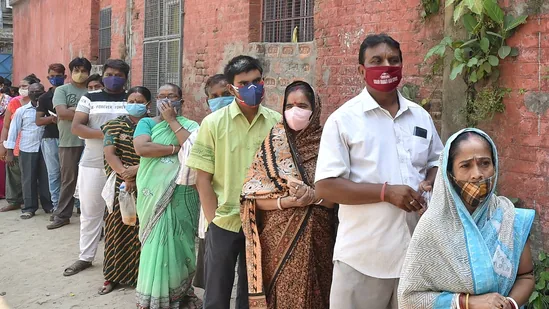Covid cases are rising exponentially in India with the third wave causing one lakh infections per day. The US has crossed one million cases per day, and India is likely to exceed that soon.
Should upcoming elections in five states led by Uttar Pradesh have been postponed because of Omicron? No, the Election Commission is right in going ahead with polls ending March 10. But it has wrongly stretched polling over seven phases starting February 10.
Omicron in many countries has surged much faster than the Delta variant did, followed by an equally sharp collapse. India is likely to follow suit. Omicron may peak by end-January and collapse to near-normal levels by late February. In South Africa, where Omicron first surged, many public restrictions are already being eased. “The speed with which the Omicron-driven fourth wave rose, peaked and then declined has been staggering. Peak in four weeks and precipitous decline in another two,” wrote Fareed Abdullah, director of the South African Medical Research Council’s AIDS and TB research, on Twitter. “It was a flash flood more than a wave.”
Omicron spreads very rapidly but causes fewer hospitalisations and far fewer deaths. In South Africa, peak hospital bed occupancy during theOmicron wave was half the Delta peak.
Young people are naturally more resistant to Covid but fewer of them have been vaccinated so far. Older folk have mostly been vaccinated already and have higher resistance to Omicron than they did when Delta struck. In South Africa, two-thirds of residents had prior resistance.
The US has a similar pattern of zooming infection rates but very little increase in fatality rates. This does not mean that Omicron is either mild or non-serious. But it is far less deadly. The US Center for Disease Control and Prevention wants schools open and kids vaccinated. Monica Gandhi of the University of California, San Francisco, estimates that Omicron in the US may peak by mid to late January and then collapse. India can expect a similar pattern.
What are the implications for elections? India has many mass rallies during election campaigns and long lines on election day. Yet these will not add greatly to everyday urban crowding or even rural crowding (several villagers may sleep in one room). Mass rallies can be banned and social distancing on election day queues can reduce health risks.
A crash programme should ensure that almost all voters in the five states are doubly vaccinated by March, and as many as possible get a third booster shot. The government claims that half the population and maybe two-thirds of voting-age persons are already doubly vaccinated.
We have an encouraging polling precedent. In April 2021, India held elections to five state assemblies —West Bengal, Tamil Nadu, Kerala, Assam, and Puducherry—without causing any great spike in Covid cases. The Delta variant had just started spiking at the time. The voter turnout was over 80% in West Bengal and Assam, and not far short of 80% in Kerala and Puducherry. In Tamil Nadu it was around 65%. Clearly fear of Covid was not a problem.
This time there was a strong case for scheduling poll dates close to the deadline of March 10 by which time the Omicron wave should have faded. Instead the Election Commission is persisting in seven phases of voting spread over a month, as in the state polls five years ago.
In almost all democracies, voting takes place on a single day. India itself used to have most elections on a single day. Then booth-capturing became such a menace in the 1980s that Election Commissioner T N Seshan in the 1990s began staggering polling dates and moving police and para-military forces from one region to another to ensure peaceful, fair voting.
That was rightly hailed as a success. However, we are now in a new digital age when booth capturing is obsolete for practical purposes. Digital cameras scan every voting booth and workers of all parties 0have smartphones galore to record any attempt at violence and intimidation. They can raise alarms and send the news to state headquarters in seconds. This itself discourages booth capturing: the miscreants know it will be quickly exposed and result in a re-poll.
Full-fledged campaigning (with accompanying health risks) will now begin just as Omicron rises. Had the Election Commission scheduled polling over no more than three days in March, that would have postponed full-fledged campaigning by a few weeks, giving time for Omicron to fade.
Some critics say that the Election Commission is no longer tough enough on hate speech and other such forms of intimidation because a majority of its members are pro-BJP. This, however, did not stop Opposition parties from doing well in the 2021 state polls and should not be any worse a problem today.
This article was originally published in The Times of India on January 8, 2022.


